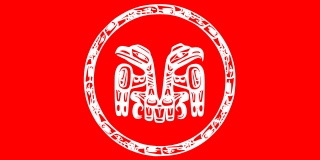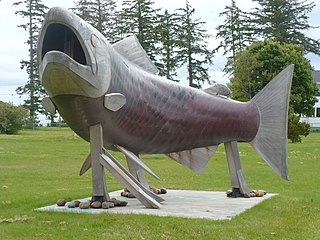Related Research Articles

William Ronald Reid Jr. (Haida) was a Canadian artist whose works include jewelry, sculpture, screen-printing, and paintings. Producing over one thousand original works during his fifty-year career, Reid is regarded as one of the most significant Northwest Coast artists of the late twentieth century.

Haida are an indigenous group who have traditionally occupied Haida Gwaii, an archipelago just off the coast of British Columbia, Canada, for at least 12,500 years.
The Haida are one of the indigenous peoples of the Pacific Northwest Coast of North America. Their national territories lie along the west coast of Canada and include parts of south east Alaska. Haida mythology is an indigenous religion that can be described as a nature religion, drawing on the natural world, seasonal patterns, events and objects for questions that the Haida pantheon provides explanations for. Haida mythology is also considered animistic for the breadth of the Haida pantheon in imbuing daily events with Sǥā'na qeda's.

Haida Gwaii is an archipelago located between 55–125 km (34–78 mi) off the northern Pacific coast of Canada. The islands are separated from the mainland to the east by the shallow Hecate Strait. Queen Charlotte Sound lies to the south, with Vancouver Island beyond. To the north, the disputed Dixon Entrance separates Haida Gwaii from the Alexander Archipelago in the U.S. state of Alaska.

Sandspit is the largest community on Moresby Island, in Haida Gwaii off the Pacific coast of British Columbia, Canada. The only town on Moresby Island, Sandspit has accommodations, a campground, supermarket and 85-berth harbour serving visitors to Gwaii Haanas.
Robert Charles Davidson LL. D. D.F.A., is a Canadian artist of Haida heritage. Davidson's Haida name is G̲uud San Glans, which means "Eagle of the Dawn". He is a leading figure in the renaissance of Haida art and culture. He lives in White Rock, British Columbia.

Haida Modern is a 2019 Canadian documentary film about the art and activism of Haida artist Robert Davidson. The film was directed by Charles Wilkinson, filmed, produced and edited by Wilkinson and Tina Schliessler and executive produced by Kevin Eastwood. It premiered at the 2019 Vancouver International Film Festival.

Jim Hart is a Canadian and Haida artist and a chief of the Haida Nation.
Charles Wilkinson is a Canadian documentary filmmaker and film and television director. He is best known for making documentaries that touch on environmental issues. These include Haida Modern, Vancouver: No Fixed Address, Haida Gwaii: On the Edge of the World, Oil Sands Karaoke, and Peace Out. All five films premiered at Hot Docs International Documentary Festival, and have gone on to win awards at Hot Docs, the Vancouver International Film Festival, le Festival International du Film sur l'Art - Artfifa, the DGC Awards, the Leo Awards and the Yorkton Film Festival. Before moving into documentaries, Wilkinson worked for many years in dramatic television series and on feature films. His directing credits include such TV series as The Highlander, The Immortal, So Weird, Dead Man's Gun, Road to Avonlea and The Beachcombers, the feature films My Kind of Town, Max, Blood Clan and Breach of Trust, and the TV movie Heart of the Storm. As a preteen, he was one of the original performers in the Calgary Safety Roundup, paired with his brother Billy as kid cowboy singers. "We sang both kinds - country and western."

Haida Gwaii: On the Edge of the World is a 2015 Canadian feature documentary film directed by Charles Wilkinson, and produced by Charles Wilkinson, Tina Schliessler, and Kevin Eastwood for the Knowledge Network. The film premiered on April 28, 2015 at the Hot Docs Canadian International Documentary Festival where it won the award for Best Canadian Feature Documentary.
Kevin Eastwood is a Canadian documentary filmmaker and film and television producer. He is best known for directing the CBC Television documentaries Humboldt: The New Season and After the Sirens and the Knowledge Network series Emergency Room: Life + Death at VGH and British Columbia: An Untold History. His credits as a producer include the movies Fido, Preggoland and The Delicate Art of Parking, the television series The Romeo Section, and the documentaries Haida Modern, Haida Gwaii: On the Edge of the World and Eco-Pirate: The Story of Paul Watson.
Tyler York is a Haida woodcarver and actor from Haida Gwaii, British Columbia, Canada. He is most noted for his performance in the Haida-language film Edge of the Knife, for which he won the Vancouver Film Critics Circle award for Best Actor in a Canadian Film at the Vancouver Film Critics Circle Awards 2018.

nîpawistamâsowin: We Will Stand Up is a Canadian documentary film, directed by Tasha Hubbard and released in 2019. The film centres on the 2016 death of Colten Boushie, and depicts his family's struggle to attain justice after the controversial acquittal of Boushie's killer.Narrated by Hubbard, the film also includes a number of animated segments which contextualize the broader history of indigenous peoples of Canada.

No Crying at the Dinner Table is a Canadian short documentary film, directed by Carol Nguyen and released in 2019. An exploration of the common stigma in Asian families against expressing emotional vulnerability, the film centres on interviews Nguyen conducted with her family, played back around the dinner table at a family gathering.

Acadiana is a 2019 Canadian short documentary film directed by Guillaume Fournier, Samuel Matteau and Yannick Nolin. The film explores the changing face of Cajun culture in the United States, and its roots in the Acadian culture of Canada, through a profile of the Crawfish Festival in Breaux Bridge, Louisiana. The film was the second part of a trilogy by the directors about Cajun culture, following Laissez les bon temps rouler in 2017 and preceding Belle River in 2022.
This Was the Time is a Canadian documentary film, directed by Eugene Boyko and released in 1970. Created for the National Film Board of Canada, the film portrays the renaissance of Haida culture through its depiction of a potlatch ceremony in Haida Gwaii, culminating in artist Robert Davidson carving and erecting a totem pole in the community for the first time in nearly a century.
Perfecting the Art of Longing is a Canadian short documentary film, directed by Kitra Cahana and released in 2021. The film is a portrait of Cahana's father Ronnie, a former rabbi who has been living in long-term care since suffering a stroke which left him quadriplegic and unable to speak, and the family's efforts to stay connected to him remotely during the COVID-19 pandemic in Canada.
Bill Reid Remembers is a Canadian short documentary film, directed by Alanis Obomsawin and released in 2022. The film is a portrait of the life and career of influential Haida artist Bill Reid.
References
- 1 2 Pat Mullen, "Now Is the Time for the Haida Renaissance: an interview with Christopher Auchter". Point of View , September 29, 2019.
- ↑ Dana Gee, "Short film celebrates return of totem pole raising in Haida Gwaii after a century of banishment". Vancouver Sun , December 20, 2019.
- ↑ Norman Wilner, "TIFF 2019: Canadian lineup includes films by Ellen Page, Alanis Obomsawin". Now , July 31, 201.
- ↑ Alex Kurial, "Haida film Now Is The Time selected for Sundance". Haida Gwaii Observer, December 13, 2019.
- ↑ Pat Mullen, "Watch ‘Now Is the Time’ on New York Op-Docs". Point of View , February 5, 2020.
- ↑ Pat Mullen, "2020 Canadian Screen Award Nominees for Documentary". Point of View , February 18, 2020.